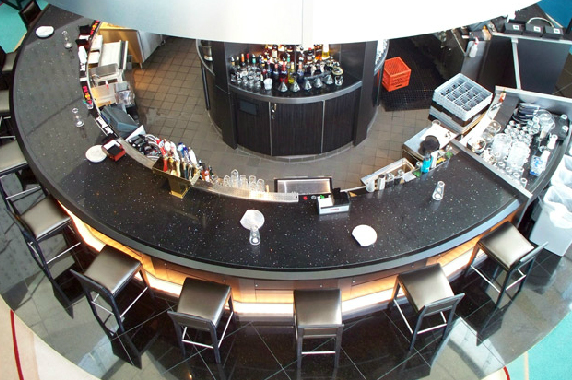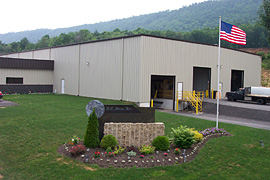Back in 1993, after pooling $1,000 in savings to start their own stone-fabricating company in a two-car garage in Bedford County, B.C. Stone founders Rodney Bair and Travis Collins had one simple business objective:
“To just drive maybe once or twice a week to do the measuring and installing as opposed to getting into the vehicle every morning at 4 o’clock and getting home at 7 or 8 at night,” says Collins.
For years, the carpool buddies had made a daily 225-mile roundtrip commute to their jobs for a stone fabricator in Rockville, Maryland.
“It was nothing to get to the shop and then have to turn around and drive down into the lower side of Virginia another hour and a half or so,” he says.
Today—with their garage shop long-vacated in favor of a 25,000-ft. custom manufacturing facility in their hometown of Everett, PA; 50-plus full-time employees; 2012 revenues topping $10 million; and their commuting days far behind them—the hometown boys are spending their reclaimed drive time giving back to their community in a variety of ways.
Custom countertops, fireplaces, tub decks, vanities
Back in their road warrior days, the B.C. duo learned the art of stone craft the hard way—by hand.
“We cut by hand, shaped edges by hand, polished ’em by hand,” says Collins, speaking for the pair after hours recently while his business partner was off coaching the local high school football team.
Their knuckle-buster education—learning to work with granite, quartz, marble—is what distinguishes B.C. Stone today in what Collins describes as an ever-crowding field of competitors.
“It was just more of a touch and a feel that you developed working with the stone,” he says. “Most people today just go buy the equipment. They don’t really understand how to take what the equipment does and just give it that extra little bit, which goes to the craftsmanship.”
gt;While B.C. Stone runs a fully mechanized shop these days—employing CAD technicians, shop fabricators, install technicians, and office staff—understanding the subtleties of stone is what helped the company become a wholesale provider for customers like Lowe’s, contractors, and cabinet shops as well as occasional retail clients as far away as Puerto Rico and the Virgin Islands.
Every once in a while Collins himself even still goes out on installs for high-profile customers or designers whose jobs require highly custom hand work, though he says everyday kitchen countertops are B.C.’s bread and butter.
When asked, the self-described vo-tech kid who studied auto mechanics and endured his long daily commute for four years “to provide for a wife and a young boy,” admits the partners’ success “was beyond wildest dreams.”
The shining example
“B.C. Stone is a case study in (entrepreneurship),” says Bette Slayton, president of the Bedford County Development Association.
“These are two people who took their skills and started a company in a garage and grew it to a national leader. They give hope and inspiration to other people who are interested in establishing a manufacturing company.”
Bedford County is situated in south-central Pennsylvania, on the Mason-Dixon Line. Collins says the local economy tends toward manufacturing these days but the area has a rich agricultural history, to which he attributes the strong work ethic of B.C. Stone employees.
While hard work built the company, however, Collins sees “smart work” as the key to success going forward, especially on the heels of what he calls the economic uncertainty our country has endured.
“With what we’ve been through since 2008, a five-year plan seems almost impossible to put together. It’s almost like—a 3-year plan, anything beyond that is just mere speculation.”
So how did the vo-tech kid and his partner build a $10 million company?
“It’s funny. As you progress, then you just move your goal further out. At some point along the way it became where I could at least see that happening, but it was only maybe five years ago I thought we would be at that point.”
Sometimes though, he says, working smarter requires adjusting the goal rather than always moving it forward.
“We ride the construction industry. We were 80 percent new construction before 2008 and since then, over 80 percent remodel. We’ve actually cut back this year compared to last year,” says Collins.
“We had projects that we were working on in Philly…we were just burning the money up in gas and overtime. We went through everything—what’s profitable, what isn’t—and went from just trying to get any kind of work in the door to keep us moving, and started to just find smart work. That’s where I would see us moving in the next three years, trying to pursue more of that profitable work that makes sense rather than just ‘It’s work. Let’s get it in the door to keep everybody busy.’”
That sense of pragmatism seems well-suited to a soft-spoken founding partner whose business grew from humble roots and whose eye, while focused on profit, is also fixed on giving back to the community that has given him so much, including tax incentives via Pennsylvania’s Keystone Opportunity Zone program.
“That’s one of those things that Rodney and I have always been appreciative of. Even though we worked hard for where we’ve gotten, we realize that people have helped us along the way,” says Collins.
“I’ve spoken at the high school before and the one thing I’ve always stressed to those kids is that it’s really important to give back…serving on boards, trying to better the community that you’re in. That brings as much enjoyment as achieving things in business—passing it along.”
Recalling a toast he gave at a friend’s wedding, Collins, who plays the guitar, used the musical analogy of a solitary
guitarist to reinforce his point.
“That music really doesn’t do much for you when you’re sitting around playing by yourself. It needs to be shared or you need to be teaching someone else how to play to really fully appreciate the gift.
“I think that’s kind of the same concept here. You always feel better about giving. You may not realize it until after it’s done.”
MARK KENNY is a Pittsburgh-based features and business writer. Send feedback here.



